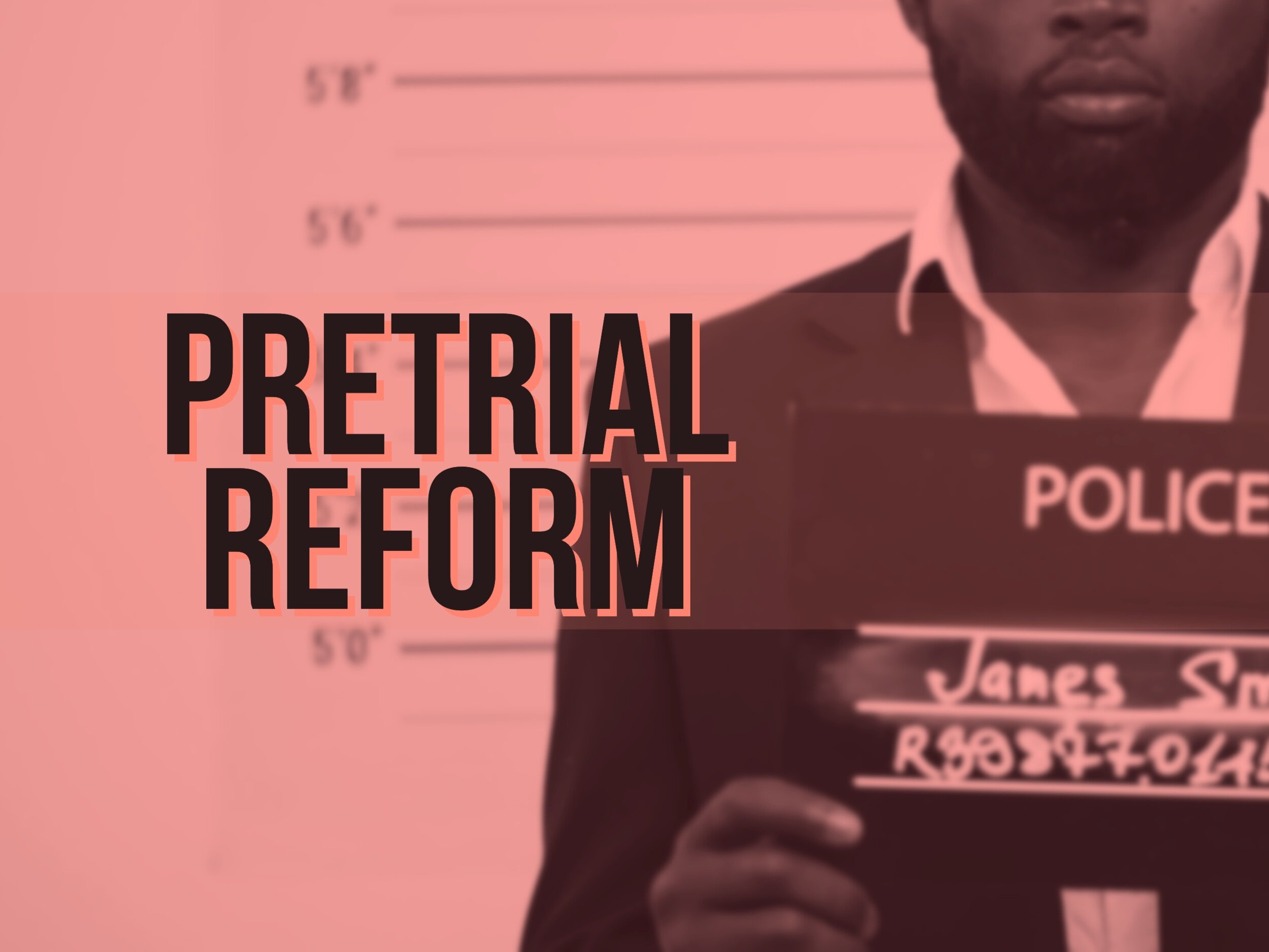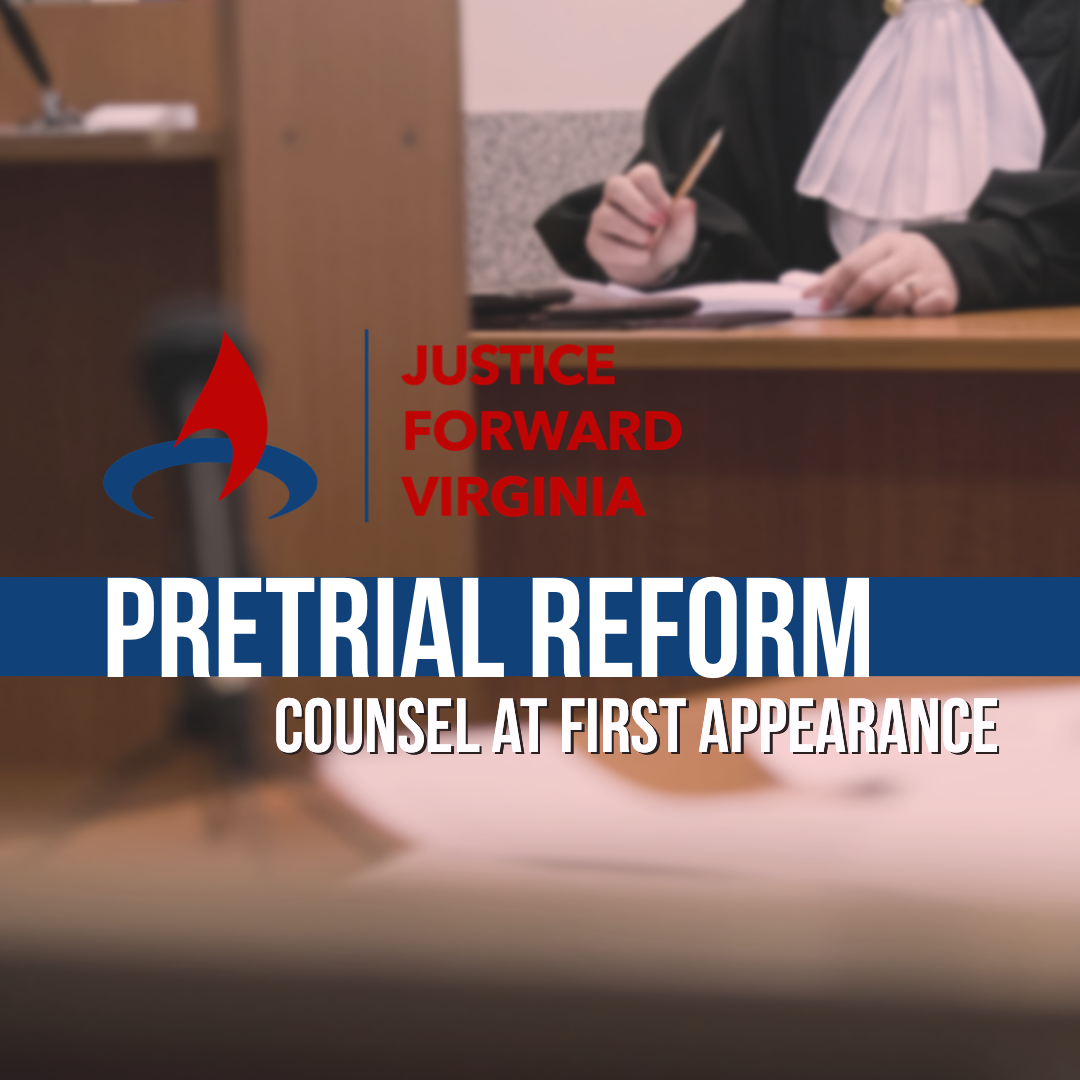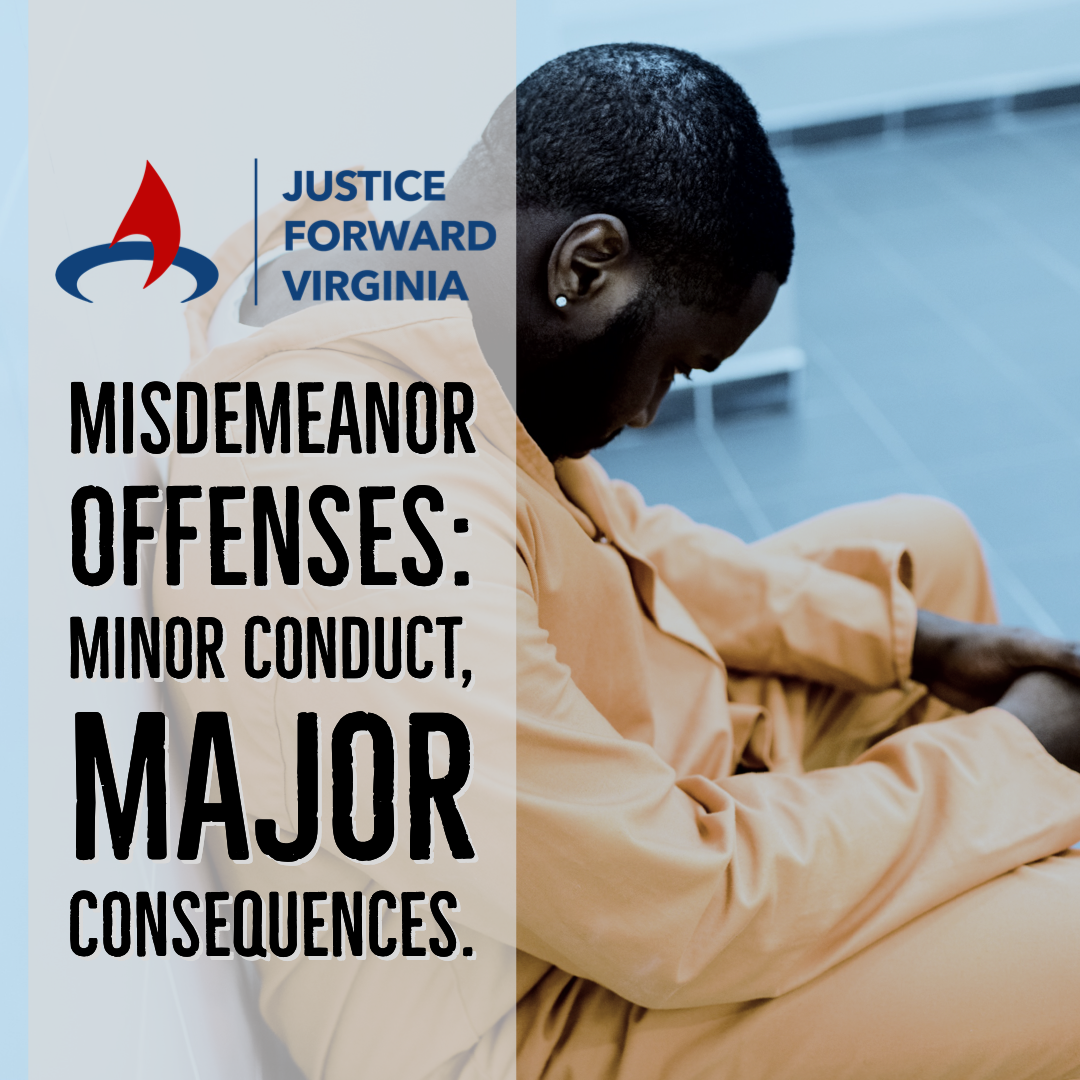Progress in Pretrial Reform
When a person is arrested they may be released while waiting for their case to be resolved or they may be held in jail until the case is decided. Pretrial detention is the time after arrest while someone is held in jail when a person has been charged but have not yet been convicted. Although this phase of the criminal legal system is not always talked about, the numbers of people being held in pretrial detention and the resources required to hold them are vast. Additionally, the decisions about whether to hold someone and for how long can have an enormous impact on the outcome of the trial as well as the life of the person accused of a crime.
Once someone is arrested, the decision about whether to release them, and under what conditions, is one of the first steps in the process.
The initial assessment is made by a magistrate who can decide whether to admit some people to bail the day a person is arrested. The magistrate is guided by legislation in Virginia that explicitly states that certain charges carry a presumption against bail.
During the 2021 legislative session the presumptions against bail law was changed, and once the law goes into effect, there will be a presumption that everyone will receive bail unless the government convinces the judge that they should not. The burden moves from the person arrested to the prosecutor.
If a person is held, they then appear in front of a judge at their first appearance, sometimes called an arraignment or advisement Although a lawyer may be present in some jurisdictions in Virginia, it’s not guaranteed and some jurisdictions prevent lawyers from requesting bail at this hearing. After that, the defense attorney can request a bail hearing. Depending on the jurisdiction this can be 2 days to several weeks after the initial arrest.
At the bail hearing, the judge will determine whether a person should be granted bail and under what conditions. This decision should be based on the nature of the charge, strength of the case, the defendant’s criminal history, community ties, and personal information such as mental health and financial resources. Studies from around the country show that bias and other factors including gender, race, and ethnicity of the accused also impact this decision.
Very often a money bond (aka cash bail) is required for a person to be released.
The purpose of the money bond is ONLY supposed to be to ensure that the defendant appears for their trial.
Other conditions for bail could include participation in a drug rehabilitation program, receiving mental health services, and pretrial services.
Getting people who are not flight risks or a threat to themselves or others out of pretrial detention as quickly as possible will go a long way toward making Virginia’s criminal legal system more fair and will prevent many people’s lives – people who are presumed innocent – from being upended.
How Many People are in Pretrial Detention?
The statistics are shocking. Nationwide 6 out of 10 people in jails, almost a half million people at anyone time, are in pretrial detention. And the numbers of people being held are increasing. Between 2012 and 2017 the number of being help pretrial grew 10% and from 2000-2014, 95% of the increase in the number of people in jails was from people being detained pretrial.
Virginia’s pretrial detention rates are higher than the national average. We have about 13,000 people – 46% of the TOTAL population in our jails being held pretrial at any one time.
What’s the Problem with Pretrial Detention?
It’s Expensive - The cost of jailing people in Virginia averages about $85.83 per day. In some counties, it is substantially more than this amount. So, if you do the math, that’s over $400 million every year that Virginia tax payers are spending to jail people who have not even been convicted and may not have committed any crime.
It infringes on Constitutional Rights - “In our society liberty is the norm, and detention prior to trial or without trial is the carefully limited exception.” U.S. v. Solerno, 481 U.S. 739 (1987) (Rehnquist, J.)
Worse trial outcomes - Defendants are not able to meet with their lawyers as frequently or as easily and are not able to assist with their own defense while in jail. In some cases, the length of time a person may be detained pretrial is close to the length of the sentence they would receive were they convicted. Many people feel forced to accept plea deals simply to get out of jail – even when they are innocent of the crimes they are charged with.
Pretrial detention leads to:
4x greater likelihood of being sentenced to jail
3x longer jail sentences
3x greater likelihood of being sentenced to prison
2x longer prison sentences
Worse life outcomes - Even short detentions are likely to cause disruption to the life of the person charged including:
Loss of employment
Loss of housing
Loss of custody of children or other family members in need of care
More likely to be arrested in the future – both before and after the initial set of charges are resolved
Even short detentions can have very detrimental effects to peoples lives, especially for defendants who are otherwise low risk.
What Have We Done to Reform Pretrial Detention?
There are lots of policy proposals that will have a positive impact on pretrial detention. During the 2021 Legislative Session, two laws related to pretrial detention that are expected to have an impact on who is held now and in the future.
End Presumptions Against Bail: Although the Constitution requires a presumption of innocence, and requires bond unless a person is determined to be a risk of flight or a danger to the community, the Virginia Code flipped the script—where certain offenses have been charged, Defendants have had to prove why they are not a danger to the community or a risk of flight if released before trial. Although those presumption offenses, like robbery or malicious wounding, sound extremely violent, they often aren’t, because of how broadly Virginia Courts have interpreted the conduct that may satisfy those statutes. Presumptions serve no real purpose other than to hold in jail people who do not need to be there before trial.
During the 2021 legislative session, the General Assembly passed SB 1266, which repeals presumptions against bail.
Data Collection: Virginia lacks a unified data collection system regarding pretrial decisions and outcomes, and should require that all criminal justice organizations in the state collect and share data on the pretrial process, such as length of pretrial detention, demographic data, and what happens when certain conditions of bail are set. This data will enable us to make more informed decisions about how to minimize unnecessary, costly pretrial detention, while promoting community safety and the meaningful, timely disposition of criminal cases. It will allow for examinations of demographics to shed light on issues of race, ethnicity, gender, and age disparities and can promote practices which move the Commonwealth towards a more just criminal legal system.
During the 2021 legislative session, the General Assembly passed HB 2110 and SB 1391 which requires the Virginia Criminal Sentencing Commission to collect and disseminate, on an annual basis, statewide and locality-level data related to adults charged with criminal offenses punishable by confinement in jail or a term of imprisonment. The bill provides that any personal or case identifying information within the data shall not be subject to the Virginia Freedom of Information Act and shall not be made publicly available. The bill does not require that the Virginia Criminal Sentencing Commission submit such annual report prior to December 1, 2022. Additionally, the bill requires the Virginia State Crime Commission to provide the Virginia Criminal Sentencing Commission with the final dataset of all adults charged with a criminal offense punishable by confinement in jail or a term of imprisonment in October 2017 and that the Virginia Criminal Sentencing Commission make such statewide and locality-level data publicly available on a website established and maintained by the Virginia Criminal Sentencing Commission as an electronic dataset, excluding any personal and case identifying information, by October 1, 2021, and on an electronic interactive data dashboard tool that displays aggregated data based on characteristics or indicators selected by the user, by December 1, 2022. As introduced, this bill was a recommendation of the Virginia State Crime Commission
What Other Legislation Is Needed?
Counsel at First Appearance: In many if not most jurisdictions in Virginia, persons who are arrested never receive a judicial determination of bond until two days after their arrest. That is because as currently written, the Code does not mandate the presence of counsel at a defendant’s “first appearance,” often referred to as an arraignment or advisement hearing. Jurisdictions where judges permit or mandate counsel at first appearance have significantly shorter periods of unnecessary pretrial detention. Social science has demonstrated that pretrial detention of even 2 or 3 days can have significant effects on one’s livelihood, including loss of employment, public benefits, child custody/visitation, and housing. Moving up a judicial bond determination by even one day could dramatically improve the pretrial outcomes and reduce recidivism.
Require an “ability-to-pay” assessment, to determine the ability of a defendant to pay a cash bond and allow the court to adjust or eliminate bond based on the defendant’s financial circumstances. No person should be held in jail simply because they are poor.
Implement safeguards to eliminate subjectivity and avoid disparate impacts on the poor and minorities.
Consider reducing our “detention net,” meaning reducing the number of charges that someone can be held in jail on before trial.







